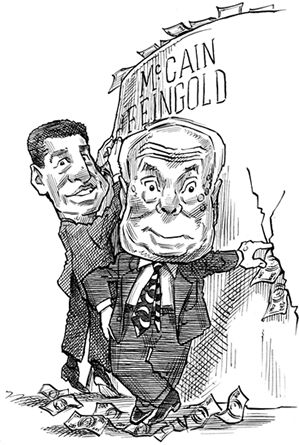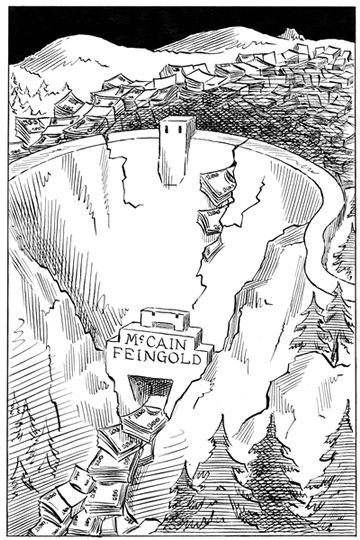- Campaigns & Elections
- Congress
- Politics, Institutions, and Public Opinion
 |
| Illustration by Taylor Jones for the Hoover Digest.
|
Well, now that we have crossed the Rubicon of campaign finance reform—now that we have, indeed, reformed—are we going to be happy at last about cutting down to size the role of money in politics? No, we are not.
Instead, I think, what we are about to learn is exactly how flexible, slippery, and innovative money can be in finding its way into the political system. A ban on soft money changes the rules by which money flows, but it does not change the fact that money flows. Where there’s a will, there’s a way. And the one thing campaign finance reform does not do, because it cannot, is diminish the will to influence elections and politicians.
That’s for the simple reason that the stakes are so huge, at least for many of the big money players, whether they are individuals acting out of ideological motivations or corporations looking for favorable treatment. Those passions won’t diminish.
Is this corrupt? Well, clearly, there have been cases of corruption, instances of undue influence involving the exchange of money and the granting of special favors. But so far as we can tell, those cases seem to be pretty rare. The picture painted by proponents of reform is of a corrupt system in which the pursuit of money has corrosive effects on individuals but, at the same time, one in which few cases of actual corruption can be pointed to.
I wouldn’t care to defend the old system of big soft-money contributions. It is at best distasteful, and who could blame Americans for taking an essentially cynical view of money in politics, namely, that all politicians are equally suspect? This is true with regard to its imputation of equality in money-grubbing, though it is dubious with regard to its conclusion that money-grubbing means corruption.
 |
| Illustration by Taylor Jones for the Hoover Digest.
|
There is nothing necessarily debilitating about this public attitude. For years, we have heard that the campaign finance system was eroding public confidence in government, and proponents of this view pointed to poll evidence showing declining levels of trust in government and its various institutions.
Yet when a moment of truth arrived, as it did on September 11, Americans had no hesitation in rallying behind the national government in support of the war against terrorism. It turns out, therefore, that the erosion constantly being decried was a temporary phenomenon, not a systemic collapse in confidence. Americans can cheerfully indulge a somewhat jaundiced view of their politicians in times of prosperity and peace yet recognize the necessity of strong political leadership when the going gets tough. So perhaps a better place to look for the origin of the jaundice is
the tranquility, when politics seemingly recedes in importance and those hell-bent to practice it seem rather odd in their preoccupations, rather than in the supposed corruption in the system.
But if the old system was indefensible, I don’t think the “reformed” system will long be seen as defensible, either. Insofar as the fund-raising apparatuses of the two major political parties are competent, they are going to find ways to do what both have become quite adept at, namely, fully funding their political operations.
Political professionals often make mistakes in the allocation of funds. We often hear that if only this candidate or that one had received an election-eve infusion of cash, the result might have been different. But the problem is not really a shortage of total cash. The fund-raisers lately have been meeting their goals, and those goals are set based on what the political operators think they need. That’s full funding, and although there may be some disruption, I think it is likely to be temporary, as the money people, both fund-raisers and donors, adapt to their changed environment.
Does money drive politics? Is it really the “mother’s milk” as claimed?
Well, you can’t do politics without money, that is certainly true. But it’s actually politics that drives money. Because political outcomes matter as much as they do, interested parties step up. That’s not corruption but a simple artifact of the size and scope of modern government. You can change the rules as often as you want, but doing so doesn’t change the interests you are trying to regulate.







